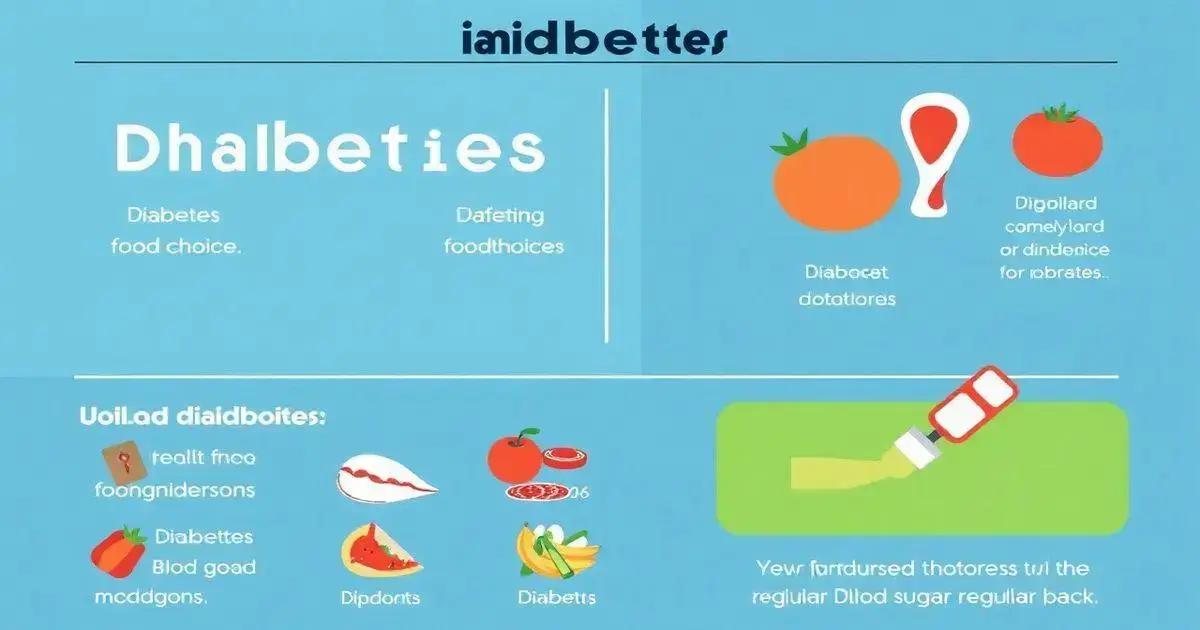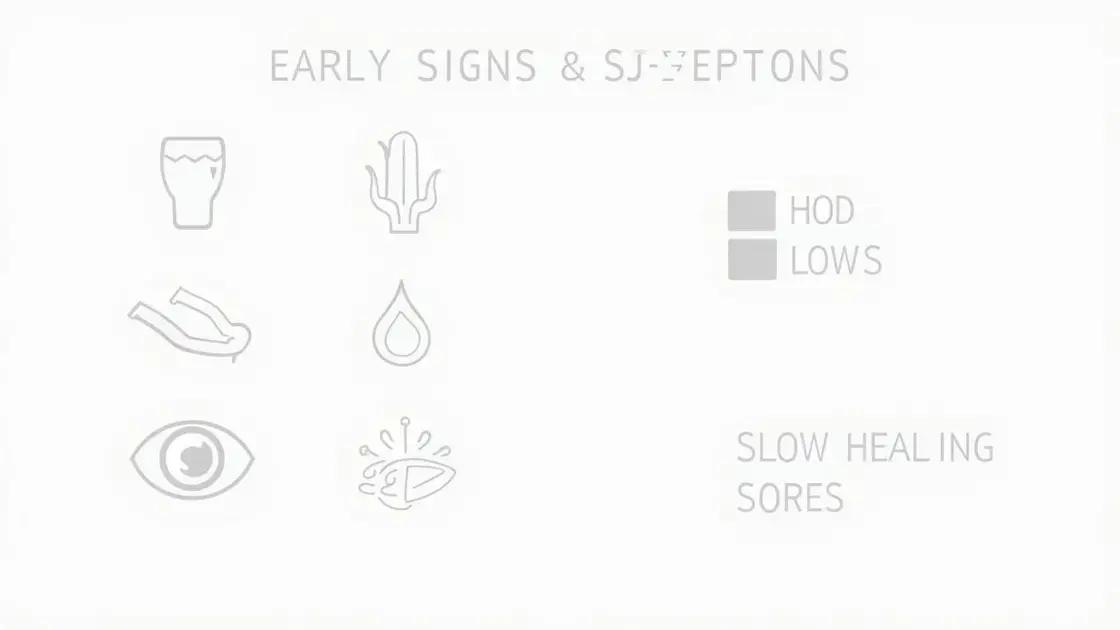Identifying and managing early signs of diabetes involves recognizing symptoms such as increased thirst, frequent urination, fatigue, and blurred vision. Effective management includes a healthy diet, regular physical activity, and monitoring blood sugar levels. It is crucial to seek medical advice if symptoms persist or worsen, as early intervention can prevent complications and improve overall health.
If you’re concerned about how to identify and manage early signs of diabetes, you’re not alone. Diabetes affects millions of people, often without them realizing it. Recognizing the early symptoms can make a significant difference in your health. In this article, we will delve into the common early signs of diabetes, strategies for effective management, and when it’s important to consult a healthcare professional.
Understanding Diabetes: An Overview

Diabetes is a chronic condition that affects how your body processes sugar (glucose), the primary energy source for our cells. There are two main types of diabetes: Type 1 and Type 2. In Type 1 diabetes, the body does not produce insulin, a hormone needed to allow glucose to enter cells. In Type 2 diabetes, the body becomes resistant to insulin or doesn’t make enough.
Understanding diabetes is crucial for managing its symptoms and preventing complications. It is important to know that diabetes can lead to serious health issues, including heart disease, kidney failure, and vision loss if not managed properly.
Risk Factors for Diabetes
Several factors can increase your risk of developing diabetes, such as being overweight, leading a sedentary lifestyle, having a family history of diabetes, or experiencing high blood pressure. Additionally, being over 45 years old, having a poor diet, and facing stress can also contribute.
The Importance of Early Detection
Early detection of diabetes can help individuals manage the condition effectively and minimize potential health risks. Regular screening, especially for those with risk factors, is essential. Knowing your blood sugar levels can help you understand whether you are at risk.
Impacts of Diabetes on Daily Life
Living with diabetes can require changes in daily habits, such as monitoring blood sugar levels, adjusting dietary choices, and incorporating regular physical activity. It is important to maintain open communication with healthcare providers to ensure effective management plans are in place.
Early Signs and Symptoms of Diabetes

Recognizing the early signs and symptoms of diabetes is vital for timely intervention. Some of the most common early symptoms include:
Increased Thirst: People with diabetes often feel thirsty due to high blood sugar levels. This can lead to drinking more fluids than usual.
Frequent Urination: When blood sugar is elevated, the body attempts to get rid of the excess glucose through urination. This results in increased trips to the bathroom.
Fatigue: Feeling tired or sluggish is common as the body’s ability to use insulin effectively decreases, leading to decreased energy.
Blurred Vision: High blood sugar can cause fluid to be pulled from the lenses of the eyes, leading to blurred vision and difficulty focusing.
Unexplained Weight Loss: When the body can’t get enough energy from food, it starts using muscle and fat for fuel, resulting in weight loss, even if you’re eating regularly.
Slow Healing Sores: Cuts and sores might take longer to heal in people with diabetes because of poor circulation and blood flow issues.
Recognizing These Symptoms
If you notice one or more of these signs, it’s essential to take them seriously. Getting diagnosed early can help manage the condition more effectively and prevent serious complications.
Monitoring Blood Sugar Levels
Frequent monitoring of blood sugar levels can also help you identify patterns that might indicate diabetes. Knowing your numbers serves as a crucial step in the management of your overall health.
Effective Management Strategies

Effective management of diabetes is crucial in maintaining a healthy lifestyle. Here are several strategies that can help:
1. Healthy Eating
Following a balanced diet is a key component of diabetes management. Focus on foods that are high in fiber and low in simple sugars. Incorporate plenty of fruits, vegetables, whole grains, and lean proteins into your meals. Portion control is important, so consider using smaller plates to help manage your serving sizes.
2. Regular Physical Activity
Engaging in regular physical activity can help control blood sugar levels. Aim for at least 30 minutes of moderate exercise most days of the week. Activities such as walking, cycling, swimming, or yoga can improve insulin sensitivity and help maintain a healthy weight.
3. Monitoring Blood Sugar Levels
Regular monitoring of your blood sugar levels enables you to see how food, activity, and medication affect your diabetes. Keep a log of your readings to help your healthcare provider make necessary adjustments to your management plan.
4. Medication Management
Your doctor may prescribe medications or insulin therapy to help manage your blood sugar levels. It’s essential to follow your medication plan as instructed and communicate with your healthcare team about any side effects or concerns you may have.
5. Stress Management
Managing stress through techniques such as meditation, deep breathing exercises, or physical activity can help keep your blood sugar stable. Finding hobbies or spending time with loved ones can also improve your mental well-being.
6. Regular Check-Ups
Frequent visits to your healthcare provider are important for managing diabetes effectively. Regular check-ups can help monitor your overall health and prevent complications.
When to Seek Medical Advice

Knowing when to seek medical advice is essential in managing diabetes effectively. If you experience any of the following situations, it’s crucial to consult a healthcare professional:
1. Persistent Symptoms
If you notice any early signs or symptoms of diabetes, such as increased thirst, frequent urination, fatigue, or blurred vision, it’s important to seek medical help. These symptoms could indicate high blood sugar levels that need to be addressed.
2. Uncontrolled Blood Sugar Levels
If your blood sugar levels frequently exceed the target range, or if you experience extreme highs or lows, contact your doctor. Uncontrolled blood sugar can lead to serious health complications.
3. Changes in Skin or Wounds
Slow healing sores or skin infections may be signs of complications from diabetes. If you notice that wounds are not healing properly or if you develop frequent skin infections, seek medical attention.
4. Mental Health Concerns
If you experience symptoms of depression, anxiety, or stress related to managing diabetes, speak to a healthcare provider. Mental health plays a significant role in managing any chronic condition.
5. Routine Check-Ups
Regular visits to your healthcare provider can help monitor your diabetes and overall health. Discuss any changes in your symptoms, lifestyle, or medications during these appointments.
6. Sudden Weight Changes
Unexplained weight loss or gain can signal changes in your diabetes status. If you notice significant weight changes without any changes in diet or exercise routine, consult your doctor.
In Summary: Managing Diabetes Effectively
Managing diabetes requires a comprehensive approach, starting from understanding the condition to recognizing its early signs and symptoms. Effective strategies such as healthy eating, regular exercise, and consistent monitoring play a critical role in controlling blood sugar levels.
It’s essential to know when to seek medical advice, as early intervention can prevent complications and improve quality of life. Open communication with healthcare professionals ensures that along with self-management, you receive the support needed for effective diabetes care.
By adopting these practices and prioritizing your health, you can lead a fulfilling life while successfully managing diabetes.
FAQ – Frequently Asked Questions about Identifying and Managing Early Signs of Diabetes
What are the early signs of diabetes I should look for?
Common early signs of diabetes include increased thirst, frequent urination, fatigue, blurred vision, and slow healing sores.
How can I manage diabetes effectively?
Effective management strategies include maintaining a healthy diet, exercising regularly, monitoring blood sugar levels, and taking prescribed medications.
When should I seek medical advice regarding diabetes?
You should seek medical help if you experience persistent symptoms, uncontrolled blood sugar levels, slow healing sores, or significant changes in weight.
What role does diet play in managing diabetes?
A balanced diet that is high in fiber and low in simple sugars can help control blood sugar levels and maintain a healthy weight.
Why is monitoring blood sugar important?
Monitoring blood sugar levels helps you understand how food and activity affect your diabetes, allowing you to make informed management decisions.
How often should I visit my healthcare provider for diabetes management?
Regular check-ups with your healthcare provider are important; you should discuss your diabetes management plan and any new symptoms at these visits.













